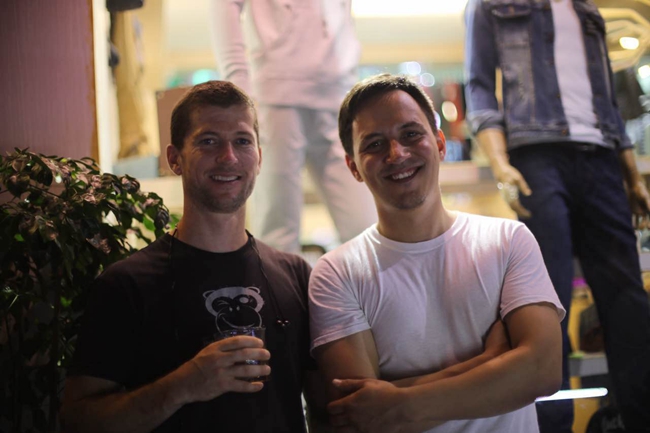Two decades of discovering China

Colin (L) has a great time with his friend in Kunming, capital of China's Yunnan Province.
Colin Flahive's Great Leaps: Finding Home in a Changing China begins with the story of a teenager named Yaya. Yaya leaves her village in Yunnan for the first time and moves to Kunming to work at Salvador's Coffee House, which is co-owned by Flahive. As Flahive recounts Yaya's tale, he is reminded of his own - and that of his business partners' - arrivals in China.
"We left everything behind to move halfway around the world, eventually found each other and went into business together," Flahive writes in his memoir. "With Salvador's Coffee House we found our place in Kunming. We could only hope that with us, Yaya would find hers too."
With Salvador's serving as the book's anchor, Flahive weaves together his own personal journey of moving from Colorado to southwest China. His first visit to the country was in 1998, when he took a semester off college in the United States to backpack through China, Nepal, India and Thailand.
A few years later, Flahive met Josh Pollock, a licensed Traditional Chinese Medicine doctor. After graduating university with degrees in Asian studies and anthropology, Flahive waited tables at a jazz bar in Boulder, Colorado. He was also recovering from a car accident at the time - in his words, "the last push I needed to leave." In 2001, he packed his bags and moved to Dali in Yunnan province.
Flahive met Kris Ariel in Dali, and the two eventually opened Salvador's Coffee House, which served Western foods and coffee made from locally grown beans. Plans were underway for a second location in Kunming, this time with Pollock and Naoko Okano as third and fourth partners, when Flahive received notice that they would have to close the original Salvador's as the building it was housed in was scheduled for demolition.
Migrating toward freedom
From the beginning of his journey as a cafe owner, Flahive observes the effects of rural-urban migration in China. Particularly for women, urban migration offered opportunities for independence and empowerment. Flahive writes: "This fact was never lost on me or my business partners. We knew that all of the girls that left their families behind to work with us were hoping to find more than just a steady salary. They hoped to discover their own potential, and it was our responsibility to help them find it."
Flahive and his partners take this responsibility seriously. Employee benefits, for example, include lessons in speaking English from foreign customers who teach the girls in exchange for free food and drinks.
Flahive's writing is smooth and fluent. He is at once conversational with his readers and making astute observations about his nearly two decades spent in China. He notes, for example, that Yaya's transition from her village in Lincang to Kunming was likely more difficult than his own move from Colorado: "In many ways, Kunming was more foreign to her than it was to me - I grew up with cars, elevators, fast-food and crosswalks. When I arrived in Kunming, I possessed the basic understanding of how cities function. For Yaya, Kunming was far more alien (she) had never even been more than five kilometers from her home."
Flahive also writes about the highs and the lows of running Salvador's, the evolution and expansion of the business, his own personal growth and that of his employees. He is a natural storyteller, which makes the book all the more engaging. Flahive is also aided by the fact that he has fascinating stories to tell. He doesn't just take the road less traveled but rather the ones yet to be built.
Editor: John Li